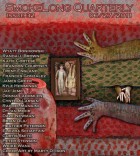I love the images in this story so very much. You said you based this story on the Nintendo video game “Gradius.” I’ve never played that game, but looking it up online it seems to be about aliens and spacecrafts. Can you talk a little about how that game translated to this story for you?
First, thank you! Gradius is an interesting case as the game itself was one of the first of its kind: a side-scrolling space-ship shoot-em-up where the game sends as many enemies as possible at you while you attempt to navigate the world and blow everything up. The game itself spawned multiple sequels and various spin-offs, such as Salamander (which I make reference to) as well as Life Force, in which the entire battle takes place inside of a human body. What is so fascinating in Gradius is that there is a constant theme of destruction and regeneration: you blow up an alien only to have another one appear right behind it. Your spaceship blows up for a moment and flickers back on the screen where it disappeared. Furthermore, the screen keeps moving you along — there is no stopping or going backwards. It literally pushes you forward. That was some of the imagery I wanted to capture in the story: that everything is sliding towards danger, and things keep appearing, getting destroyed, and re-appearing.
Are you doing a series of stories based on video games? Why? And what other games have you written about?
I’m currently putting the finishing touches on Leave Luck To Heaven, which is a collection of 32 lyric essays based off of 8-bit Nintendo games. There are some other “gaming elements” included in the collection, such as “boss battles” and “save points” as well. I’ve covered the majority of the classic games, (Zelda, Ninja Gaiden, Super Mario Bros, Tetris) plus a couple of my personal favorites and games that affected me when I was growing up (Maniac Mansion, River City Ransom, Shadowgate). Video games have been such an important part of my life as well as my childhood — to me they’re like the new version of fairytales: classic stories that everyone can relate to in different ways. We all remember the moment when we used the whistle to drain the pool in Legend of Zelda, we remember the basements and bedrooms that we played these games in vividly. I’m a firm believer in writing what you love, and I loved everything about these games (and still love them!) and so it just made sense to start writing about them: these games as extended metaphors for my own life, whether it is “modern-day Brian” or “Brian as a child,” the images resonate greatly with me.
I loved this story even though I didn’t really understand what it was about. The rhythm and the language captivated me, and it still does every time I reread. Do you find that you like stories more when they “break the rules” of traditional narrative? Do you write this way often or is this an exception?
I’ve never been one for “traditional narrative” as I struggle with writing that way! I find a lot of joy in having a story to tell and attempting to express it in moments and small nuances: I never go out and say “this is about this thing.” Instead, I am more concerned in creating emotion: to have someone feel the story rather than understand it. As a non-fiction writer, it’s a†conundrum: there are so many things to say, and yet there’s a fear in saying them out loud, so we search for other ways to express these thoughts — through research, through extended metaphors, through synthesis and parallels; the ability to say everything without saying everything. My thesis adviser, Michael Martone, talked about the concept of “leakage” — these moments where the actual story shines through and the reader can get a glimpse of what’s really going on behind the tapestry, and I’ve always been fascinated by those moments and the power that they hold. The story is a basic one: a person I love has Trichotillomania — the need to pull one’s hair out. The city I live in (Tuscaloosa, Alabama) is slowly sliding into the Black Warrior River. These moments fused with the gaming language as well as the idea of movement and regeneration are layered on top of each other to create some sort of mosaic. (I should add that this story was written well before the tornado hit Tuscaloosa in late April — although as someone who includes Tuscaloosa in a lot of my writing, there’s a sort of eeriness in going back to these pieces that were written before the storm and see how they’ve changed.)
You mentioned a lot of these already, but when I was younger I was obsessed with Metroid, Tetris and Super Mario Brothers. What’s your favorite Nintendo game ever?
Oh man. This is a tough one. A lot of my favorites were actually Super Nintendo games: A Link To The Past, Earthbound, Super Metroid. As for NES games, I’ve always loved River City Ransom, the Megaman series, and Dr. Mario. If we talk about modern games, I adored Bioshock, as well as the Metal Gear Solid series. The other day I spent eight straight hours playing the new version of Mortal Kombat. I play a lot of FIFA as well.
Dr. Mario! I loved that game. Ok, enough about video games. What else do you do when you’re not writing?
I’m on the Internet constantly. I just love information, whether it’s reading articles or seeing what various B-List celebrities are up to on Twitter. There isn’t a ton to do in Tuscaloosa, but I’m fortunate enough to have a really great group of friends, so we do a decent job of entertaining ourselves. I unabashedly love pop music and so I throw a bunch of dance parties at the local bar. I play a good amount of basketball. Maybe a video game or two.




 The SmokeLong Grand Micro Contest (The Mikey) is now an annual competition celebrating and compensating the best micro fiction and nonfiction online.
The SmokeLong Grand Micro Contest (The Mikey) is now an annual competition celebrating and compensating the best micro fiction and nonfiction online.